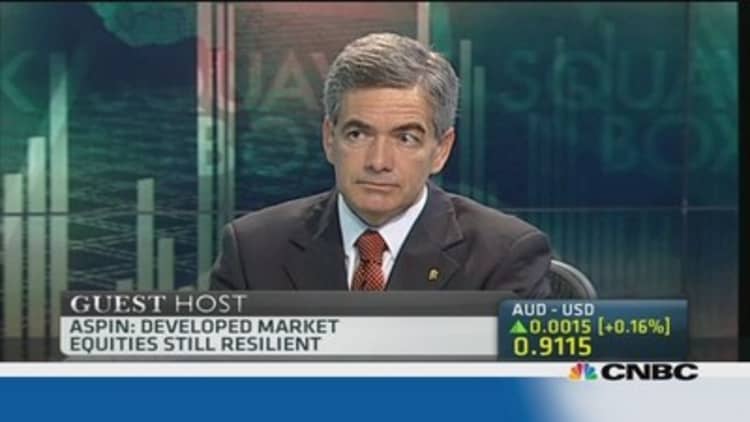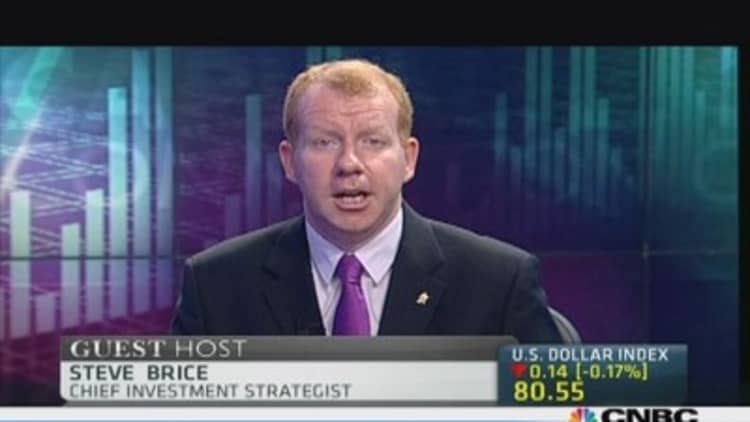Investors and analysts spent a lot of 2013 talking about the "great rotation" - how floods of money would exit the fixed-income markets to the benefit of global stocks. It made for fantastic headlines, but more importantly, it seized a very elementary fact: that bonds weren't looking as good as equities.
By the end of last year, however, it emerged that that there could, in fact, be buyers of both stocks AND bonds. And now another question has come to the fore: Will 2014 see another "great rotation": a shift from outperforming stock markets back into the, comparatively speaking, underperforming European equities?
Let's briefly recap. Despite the exhausting uncertainty over the global economic recovery and tapering of the U.S. Federal Reserve's massive bond-buying program, stocks surged in 2013. U.S. equity markets catalogued their strongest year since 1997 with the putting on gains of 30 percent, the Nasdaq index was up 38 percent, and the Dow Jones gained 27 percent in its best year since 1995. The Dow and the S&P 500 both finished the year at record closing highs.
(Read more: BlackRock CEO sees 'Great Rotation' in bonds)
In Asia, the outperformer was Japan's Nikkei 225 which added 52 percent; helped along by Prime Minister Shinzo Abe's monetary and fiscal policy overhaul to get to grips with the country's 20-year deflationary stagnation.
In Europe, the strongest performer of the major indexes was Germany's Dax which rose 23 percent. In comparison, France's CAC added 18 percent, Spain's IBEX rose 21 percent, and the Italian MIB added 'just' 12 percent. In the UK, the FTSE closed out 2013 up 14 percent.

'Analysts underestimating European recovery'
Bob Parker, Senior Advisor at Credit Suisse, says a main theme this year is to be long on European equities. He believes we will see more investors taking profits in the US, and that "analysts are underestimating the European recovery."
With recent data from Spain and Italy being very strong -- while France's figures raise questions – Parker says the early year European equity out performance will continue, with periphery Europe set to outperform the core. "European stocks could easily be up 10-15 percent by the end of 2014," states Parker.
(Read more: More bang for your investing buck outside US?)
On top of that, Parker thinks emerging markets will capture even more of our attention this year. At the moment, investors have lost confidence in emerging markets, with many closing their equity and currency positions. But later on in the year, Parker believes, there will be a huge opportunity to go back into emerging markets, which now are very cheap.
Apart from Europe, Parker advises to stay long Japanese stocks. Also, given the possibility of further Fed tapering, Parker says to go long the US dollar and credit risk. Industrial metals will be a good play on the strengthening global economy, but he says go short energy due to increasing supplies.

Goldman: 2014 European profits to grow 14 percent
In a note titled "Euro Vision – Equities Growing Up," Peter Oppenheimer, Chief Global Equity Strategist at Goldman Sachs, and his team argue that "we are in a transition from a 'hope' or value-driven phase of the (expansion) cycle, typical of recoveries from recessions, into a slower but longer 'growth' phase driven by earnings growth."
The authors of the research expect European profits to grow 14 percent in 2014 led by progress in global growth and margins. They point out the pace of growth would be slow, but there would still be enough momentum to generate a 15 percent total return through the coming year. More importantly, according to the Goldman paper, a continuing secular – investments that can gain in both good and bad times -- upswing in stock markets can go on for a long time.
(Read more: Goldman: How Europe outperforms in 2014)
When looking at how best to invest, the average performance of a diversified Japanese fund was around 25 percent last year, underperforming the local stock market's return of 51 percent. Similarly, the average US fund returned 25 percent, underperforming the Nasdaq index's return of 34 percent. Hindsight is a fantastic thing, and in this case, investors would have benefitted by just investing in a "tracker" fund instead of attempting to do better than the market. If betting on Europe this year, one might want to consider a similar broader approach.

